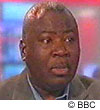I was at 10 Downing Street recently, which was interesting as it is a while since I have been able to observe our Prime Minister close up.
For a bit of context I should add that this was before the recent re-shuffle and also before the local election results which this sought to distract attention from, and arguably draw some kind of line under. Though quite how is a mystery, given that those most responsible for the dire results are still in the cabinet (
Jowell, Beckett, possibly Prescott, and certainly the Prime Minister himself), while those least so (Straw) are not; for all that the jug-eared reluctant authoritarian, Clarke, is no longer dining at the big boys table.
The timing of my visit to number 10 is relevant because I was moved to comment to a colleague how assured and relaxed Blair still was in his role - far more so in fact than he used to be. While Blair's media friendliness has always been commented on from the moment of his election as Labour Party leader - and he
has always given good TV - in person he was often slightly awkward and uncomfortable with informal interactions, whether involving small-talk or indeed unscripted questions on the detail of policy matters.
Emeritus Profesor Hugh Berrington of Newcastle University views that awkwardness, rightly I think, as the slightly distant psychology of one of the perpetually needy over-compensating outsiders who are so often elected as leaders of nations in order to fight their personal battles with low self esteem and compensatory paranoia across rather more substantial battlefields, such as those of the coalfields of the North and the oilfields of the Middle East.
Blair has now turned the remnants of this personal awkwardness into a faux self-deprecatory camp which he uses to great effect on all and sundry (he has probably always done this, but now the originating awkwardness is generally nowhere to be seen). Curiously the matured Blair act is more Prince Charles than Queen Margaret. It is very 'chat show' too, he didn't pull a guitar out on my visit but he was moved to a suggest that 'these days I think all we are good for is photo shoots' before strolling though for some shots during which he variously complemented everything from his audiences triumphs over personal adversity to their weight loss and muscle development.
Blair is at this point very much the finished article, ironically enough just as he is indeed finished. But he is still a performer, indeed a better one than he ever was.
All those in public life and indeed in any communication role have to be. It's important, you have to give attention to people, appear to focus on them, you have to look engaged and indicate that you have noticed them through comment, while also indicating - through thought and pauses - that you are paying attention to what they have to say - and, indeed, to what they represent, as well as to the simple fact of their prescence. This is all good, this is all necessary.
But now to business, as the PM may have thought as he left his photo-shoots to turn his attention to more substantial matters.
Blair's re-shuffle confirmed my reactions at number 10 in so far as it was in no sense the action of a man preparing to hit the US lecture circuit, though, for all that, one must also reflect that this is a man with a big, if not quite Clintonesque, ego and look a little at Clinton's final months in office. It is not in the nature of such egos to ever truly admit even to themselves the imminence of the loss of power and status about to befall them. America with its habit of calling all ex-Presidents 'Mr President' (did someone mention camp? - oh, get over it), building celebratory libraries and offering roving ambassadorships to the world and roles in reconstruction after national disasters such as Katrina, does much to assist the ex-leader in fostering this illusion.
That said Blair's elevation of his lieutenants and cheerleaders and demotion of those who appeared to have begun planning for a post-Blair world, offers little hope to those who would be glad to see the back of him soon enough for Gordon and the party to have a slim chance of re-building and refocusing in time to avoid the hung parliament which appears increasingly inevitable at the next election and which it is quite possible that Blair secretly sees as his true legacy to British politics.
That the likely coalition will be between the liberals and conservatives rather than inviolving Labour is a reality which the rest of the parliamentary Labour Party and what is left of the party in the country is gradually waking up to. Of course in Blair's wettest political dreams it would be between Labour and the Conservatives against the anti-warriors of Liberal Democracy but even Blair's great performances have not so detached Labour from its roots, nor indeed convinced those roots that the path he led us on to war was right.



